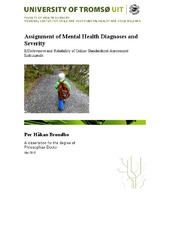Assignment of mental health diagnoses and severity : effectiveness and reliability of online standardized assessment instruments
Permanent lenke
https://hdl.handle.net/10037/4521Åpne
Thesis introduction (PDF)
Brondbo PH, Mathiassen B, Martinussen M, Heiervang E, Eriksen M & Kvernmo S.: 'Agreement on web-based diagnoses and severity of mental health problems in Norwegian child and adolescent mental health services', Clinical Practice & Epidemiology in Mental Health (2012), vol. 8, pp.16-21 (PDF)
Brondbo PH, Mathiassen B, Martinussen M, Heiervang E, Eriksen M, Moe T, Saether G & Kvernmo S.: 'The strengths and difficulties questionnaire as a screening instrument for Norwegian child and adolescent mental health services, application of UK scoring algorithms', Child and Adolescent Psychiatry and Mental Health (2011), vol. 5, no. 32. (PDF)
Dato
2012-09-26Type
Doctoral thesisDoktorgradsavhandling
Forfatter
Brøndbo, Per HåkanSammendrag
During the last decade, child psychiatry has been a focus of the Norwegian government's plan to improve mental health care. Psychiatric assessment of children and adolescents is more
complex than that of adults, and rating scales and diagnostic instruments have become increasingly important tools in both research and clinical practice.
This dissertation investigates standardized assessment instruments used in routine clinical
practice to assign diagnoses and severity of mental health problems. Both the reliability and the validity of some instruments were examined, and a main focus was the clinical usefulness of
these instruments and their potential for more effective use of limited clinical resources. In paper 1 the agreement between diagnoses and severity ratings assigned by clinical specialists who were trained Child and Adolescent Mental Health Service (CAMHS) researchers examined. Information on 100 youths was obtained from multiple informants through a webbased
Development and Well-Being Assessment (DAWBA). Based on this information, four experienced clinicians independently diagnosed (according to the International Classification of Diseases Revision 10) and rated the severity of mental health problems according to the Health of the Nation Outcome Scales for Children and Adolescents (HoNOSCA) and the Children’s Global
Assessment Scale (C-GAS). Agreement for diagnosis was - =0.69-0.82. Intra-class correlation for single measures was 0.78 for HoNOSCA and 0.74 for C-GAS, and 0.93 and 0.92, respectively for average measures. Information obtained with the online DAWBA may be a sound basis on which to establish reliable clinical diagnoses and severity ratings for common mental health disorders in a clinical setting. A clinical practice that includes systematic, multiple
independent assignments of diagnosis and severity, is preferable due to the resulting improved reliability of the severity ratings. In paper 2 the application of specific scoring algorithms for the Strengths and Difficulties
Questionnaire (SDQ) was examined. Could available online norms be useful in screening for mental health disorders among children and adolescents in the CAMHS North Study? A total of 286 outpatients, aged 5 to 18 years, were assigned diagnoses based on the DAWBA. The main diagnostic groups (emotional, hyperactivity, conduct and other disorders) were then compared to the SDQ scoring algorithms using two dichotomisation levels: ‘possible’ and ‘probable’ levels.
Sensitivity for the diagnostic categories included was 0.47-0.85 (‘probable’ dichotomisation
level) and 0.81-1.00 (‘possible’ dichotomisation level). Specificity was 0.52-0.87 (‘probable’
level) and 0.24-0.58 (‘possible’ level). The discriminative ability, as measured by ORD, was in
the interval for potentially useful tests for hyperactivity disorders and conduct disorders when
dichotomised on the ‘possible’ level, but outside the interval for potentially useful tests for all
diagnostic categories when dichotomised on the most common used ‘probable’ level. In conclusion, the ability of the SDQ to detect mental health disorders among patients referred to CAMHS is not sufficient for clinical purposes. When used as a screening instrument to determine whether further evaluation is warranted in a clinical CAMHS sample, the SDQ seems best suited to identify children and adolescents who do not require further psychiatric evaluation, although this also is problematic from a clinical point of view.
In paper 3 the agreement between diagnoses and severity assigned by clinical specialists
trained as CAMHS researchers, based only on DAWBA information collected online, and the routine clinical assignments by CAMHS clinicians was examined. Routine clinical assignment of
diagnoses was compared to online clinical assignment of diagnoses for 286 patients from the
CAMHS North study. Chi square analysis, kappa statistics and multinomial logistic regression
analyses were performed. Raw agreement for diagnostic categories varied between 74% and
90%, resulting in kappa values of 0.41-0.49. The final multinomial regression models were
significant. Agreement on mental health diagnoses can be fair when online clinical assignments
and routine clinical assignments of mental health diagnoses are compared. This may be sufficient
to replace the routine clinical assignment of diagnoses with an online clinical assignment in order to save time and resources. We also examined factors contributing to agreement or disagreement on the diagnoses. Age, gender and number of informants significantly contributed to the explanation of agreement and disagreement for ‘emotional diagnosis’ and ‘hyperkinetic/conduct
diagnosis’. However, the changes in odds were small in magnitude and the factors probably do
not consistently contribute to the understanding of agreement or disagreement in any clinically
meaningful way.
Lastly, implications for further research on reliable and effective assessment methods are
discussed.
Beskrivelse
Paper 3 of this thesis is not available in Munin:
3. Brondbo PH, Mathiassen B, Martinussen M, Handegard BH and Kvernmo S.: 'Agreement on diagnoses and severity of mental health problems between a research and a naturalistic clinical setting' (manuscript).
3. Brondbo PH, Mathiassen B, Martinussen M, Handegard BH and Kvernmo S.: 'Agreement on diagnoses and severity of mental health problems between a research and a naturalistic clinical setting' (manuscript).
Forlag
University of TromsøUniversitetet i Tromsø
Metadata
Vis full innførselSamlinger
Copyright 2012 The Author(s)
Følgende lisensfil er knyttet til denne innførselen:


 English
English norsk
norsk
